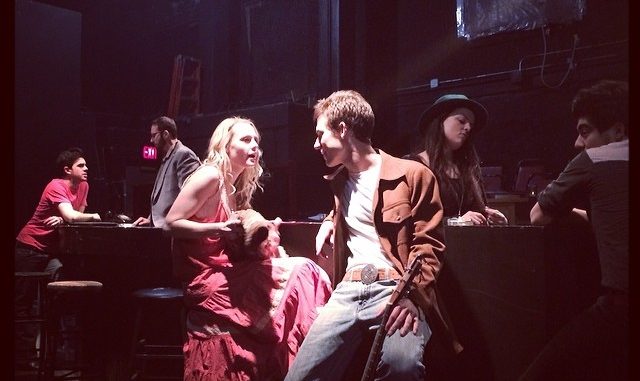
Folk City: The Musical details the eponymous bar’s history.
While Greenwich Village provided the kind of bohemian culture and vibe that served as the perfect atmosphere for protest music in the early ‘60s, Gerde’s Folk City proved to be ground zero for that era’s soundtrack. Folk City: The Musical, a production based on the club’s history and inspired by former Long Island Press Editor-in-Chief Robbie Woliver’s 1986 book Bringing It All Back Home, clearly struck a nerve when it ran at the Theater for the New City in New York City in 2016 followed by a 2018 run at the Brunish Theater in Portland, OR.
Written by Woliver and Bernadette Contreras, Folk City: The Musical wound up winning 10 out 10 Broadway World awards for which it was nominated, including “Best Musical.” But when the show was set to return to New York City, the brakes were slammed on it being staged thanks to the pandemic effectively shutting down the theater world. But rather than let this production die on the vine, Woliver pivoted and decided to record a double-CD studio cast album of the same name consisting of all-original material versus filling it out with the famous songs from the original production. Next, a movie adaptation was signed with award-winning filmmaker Jane Spencer set to direct.
“We were originally using songs like ‘Blowin’ In the Wind,’ ‘Sounds of Silence,’ ‘For What’s It’s Worth,’ and ‘California Dreaming’ in the original show,” Woliver explained. “It was not only expensive and prohibitive [to license them], but time-consuming. I realized that a lot of shows like Hamilton and Hades Town were being propelled by their soundtracks, and that was another reason to go in this direction. Plus, it’s more meaningful and more credible having an original score”
It’s all personal for Woliver, whose connection to Folk City goes back to 1977, when he, wife Marilyn Lash, and Joseph Hillesum took over the booking duties before buying the club from Mike Porco. And it was during the trio’s stewardship that billings expanded from the venue’s original eclectic mix of folk (Bob Dylan, Joan Baez), jazz (Larry Coryell), blues (Muddy Waters), gospel (Sweet Honey In the Rock), and psychedelic rock (Jimi Hendrix) to embrace newer alternative acts (Sonic Youth, X, The Replacements, 10,000 Maniacs) and comedians (Adam Sandler, Chris Rock). Being involved with the club also tapped into his red diaper baby progressive roots growing up in Plainview, where folk music took root in being a major creative inspiration.
“I grew up listening to the music of The Weavers, Harry Belafonte and Odetta,” Woliver explained. “Odetta is really the first vocalist I remember hearing. It just changed my life and made me fall in love with music. And then becoming friends with her. Folk City — there are no words for it. She sang at our wedding. I also ended up meeting and befriending some of the same people I grew up listening to.”
Suffice it to say that while the framework of Folk City: The Musical was in place, rebooting the score with all-original songs proved to be a Herculean effort. Thirty new songs replaced the original jukebox score while tapping into 12 songwriters, eight vocalists, seven producers, and recording in 14 studios in 10 different states. And it was all done while scheduling around the participants’ COVID-19 outbreaks.
For Woliver, who started out as a songwriter, finding creative partners found him reaching into his past and networking to find newer talent. Among the allies he tapped were former Folk City soundman and Lemon Twigs partner Ronnie D’Addario (“He knew the scene and was perfect to that because he is multi-dimensional in his influences as well as being an extraordinary musician and a great songwriter who wrote half the songs”).
Other major contributors included multi-instrumentalist Filippo De Laura (“He is really brilliant and plays every weird and exotic instrument. He was able to bring in all those sitars and tablas for the psychedelic songs”), famed blues artist Tracy Nelson, whose signature song “Down So Low” was used in the original production and jazz/folk singer-songwriter Lili Añel.
“She was one of my favorite artists at Folk City,” Woliver said. “I had a lyric that ran true to me and I’d hear Lili’s voice singing it. We’re still friends and I asked her if she wanted to co-write this song. She’s not a collaborator—she writes her own songs. It clicked with her and it turned out to be one of my favorite songs on the album and one of the standout songs on the album.”
Given the breadth of genres the club presented from one night to the next, the musical’s characters represent that diversity from the doo-wop-obsessed club regular Tony D’Angelo and acerbic Beatnik poet Jazz to African-American vocalist/waitress Karen Fairchild and folk-blues troubadour Dean Graham.
The music convincingly conveys the original club’s vibe thanks to gems ranging from the subtle psychedelic-kissed “Stars, Baby” and its delicate use of sitar and harmony-soaked ‘60s pop of “Love at Third Sight” to the gritty slide-guitar ballad “My Baby’s the Groove” and the British Invasion earworm “It’s a Shot,” featuring a vocal originally recorded by late Smithereens founding member Pat DiNizio back in 2013.
And while Woliver was able to bring back the male cast that had performed in prior Folk City: The Musical productions, the hunt was on for female vocalists.
“We couldn’t get our female cast from the shows, who are really, really outstanding,” Woliver said. “They were ending up in other shows and couldn’t do this.”
Among Woliver’s vocal saviors were former student Emily Blount, who sings as jazz (“She sent me a demo that completely blew me away, not only because I loved it, but because it was the character”) and former Tommy Boy Records recording artist Paula Brion, who provided the Karen Fairchild vocal.
“There was a specific bring-down-the-roof voice that we needed for her,” Woliver said. “We were already auditioning a lot of people and it just wasn’t clicking. Paula is a vocal coach and I asked her to give me some of these people she was mentoring and dealing with. She sent me tapes and nothing was cooking. I told Paula to sing me the song and send me the demo and I told her she was it.”
The sweat equity poured into this double-CD release that’s set for release on Oct. 11 via Jay Records in association with Cherry Red Records and MVD Entertainment led to For Your Consideration Grammy entries in seven different categories.
“Getting this soundtrack pulled together has been a very intense period,” Woliver said. “But I’m proud of how we were able to navigate through these different incarnations of the show. And now we get to have this new version out there with these newer songs being the music that’s going to be in the movie.”


